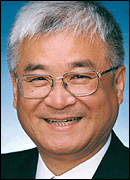

![]()
Pacific Perspective


![]()
Pacific Perspective
Is Hong Kong’s currency
board system in trouble?The recent collapse of Argentina's currency board system raises concerns about Hong Kong's ability to sustain its currency peg to the U.S. dollar. Hong Kong has been operating a currency board system that was established in 1983 to peg its currency at HK$7.78 to US$1.
A currency board is a monetary institution that issues base money solely in exchange for a major international currency known as reserve currency.
The currency board is a special form of fixed exchange rate arrangements usually adopted by smaller economies. For instance, Bermuda and the Cayman Islands take on the U.S. dollar as their reserve currency, the Kingdom of Brunei adopts the Singapore dollar, and Gibraltar uses the British pound. Since the Argentina decision, Hong Kong is the last major economy relying on a rigid pegged exchange regime.
In reaction to the failure of Argentine currency board system, the Hong Kong Monetary Authority (which is the de-facto central bank) identifies two major differences between Hong Kong and Argentina: Hong Kong has the world's fourth largest foreign exchange reserves of $110 billion and it owes zero external debt.
A reality check of Hong Kong's economy, however, indicates a heavy economic cost is paid by its public and private sectors to keep the currency board system.
First, Hong Kong's export competitiveness has been deteriorating. Since the nominal exchange rate remained un- changed from 1983 to the present, the Hong Kong dollar has become overvalued in reality. The currencies of five Asian economies (Korea, Malaysia, Singapore, Taiwan and Thailand) that compete with Hong Kong on export markets have depreciated on an average of 30 percent since 1997. As a result, Hong Kong exporters' profits have been squeezed.
Second, Hong Kong's jobless rate has risen to 6.1 percent, the highest since the East Asian financial crisis in 1997. Local economists predict unemployment will hit 7 percent this year. Third, the consumer price index has fallen for the last 37 straight months, making deflation a part of Hong Kong's economic life and significantly eroding corporate profits. Fourth, this year's budget deficit may reach $10 billion or about 6 percent of Hong Kong's GDP, which raises a red flag considering a narrow base of tax revenue. In reflection of these recent economic statistics, the Hong Kong stock market fell by 20 percent in 2001.
With its currency pegged to the U.S. dollar, Hong Kong effectively substitutes monetary policies of the U.S. Federal Reserve for its own. Unfortunately, the Hong Kong and U.S. economies are not always synchronized largely due to China's increasing influence over Hong Kong.
At present, Hong Kong's trade with China accounts for about 40 percent of the trade volume, while its trade with the United States is less than 14 percent. As a result, Hong Kong's economic problems become more complicated to solve when cyclical movements of the U.S. and Hong Kong economies diverge as they do now. Another negative factor that is eroding confidence in the Hong Kong currency board is the weakening yen.
Economic policy makers in Hong Kong have an uphill battle to fight and the time is running out unless periodic adjustments are made to the pegged rate.
S. Ghon Rhee is the K. J. Luke Distinguished Professor of International Finance and Banking at the University of Hawaii College of Business Administration. Reach him at rheesg@hawaii.edu.